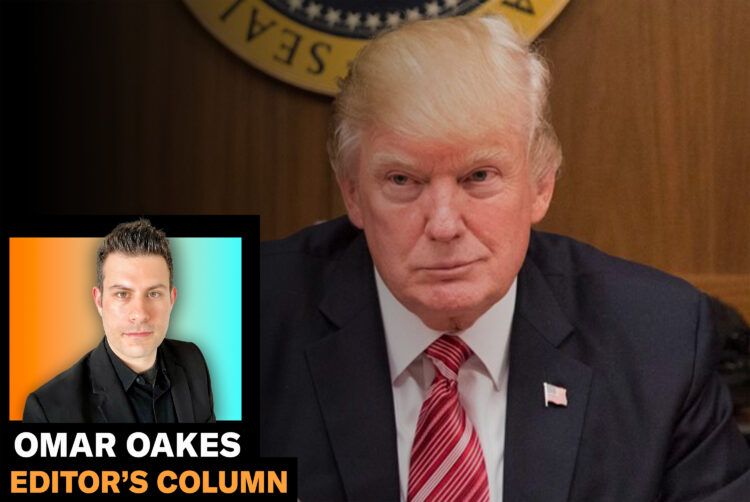You can’t be pro-Trump and pro-media

Opinion: 100% Media 0% Nonsense
When influential media owners like Elon Musk throw money at Donald Trump, it should concern all of us who work in this industry, writes the UK editor-in-chief.
A little secret about B2B publishing: writing about politics is terrible for our business.
As editor, I get complaints whenever commentary is supportive or critical of left-wing and right-wing politicians. I get it: people want a publication like ours to be “non-political” — a zone of tranquility where they can learn about industry issues without the tribalism, performance and nastiness that follow politics around like a bad smell.
But here’s the trouble with “staying out of it”: media owners mix themselves with politics all the time for commercial advantage.
This isn’t a decision I take lightly to use my column in this way. But it’s important.
You are the company you creep
In the last few days, it has emerged that Twitter/X owner Elon Musk is donating millions of dollars to Donald Trump’s campaign for US president.
This is despite Trump being found by a court to be a rapist.
This is despite Trump being perfectly happy to let his supporters wage war on Washington DC in an attempt to overthrow a government that was about to controlled by the man who beat him in an election, Joe Biden.
Just last week, in Trump’s acceptance speech for the Republican nomination in this year’s election, he repeated “the big lie” and pledged that “we’re not going to let that happen again”.
And it’s despite Trump being a convicted felon. He has been convicted on 34 counts of falsifying business records to cover up an affair with a porn star when he ran for president the first time.
This matters, because X remains an influential media company that is used by journalists, influencers and content creators around the world.
Now that its owner is actively trying to get a criminal elected as president, what faith should users or advertisers have that X’s content algorithm won’t favour Trump instead of the Democratic candidate?
If you’re prepared to associate yourself with a person like this, it doesn’t do much to inspire trust.
Brand-safety numberwang
And yet X can point to DoubleVerify claiming that it is “99.99% brand-safe”. Hmm.
Let’s leave aside (if humanly possible) the fact that Musk himself posts antisemitic garbage on X.
Or that, since he bought the company, Musk has welcomed back previously banned monsters such as Andrew Tate — a devout racist and misogynist — and Alex Jones, the guy who suggested that the Sandy Hook massacre in 2014 was “staged”.
Leave that aside, if your anger is still able to be contained.
Let’s accept at face value that Musk, Tate, Jones and all the other ghouls whose mission is to spread hate and lies — the very things that broadcasting had done perfectly well without in the 20th century — only make up 0.01% of non-brand-safe content on X.
We all know that reach is a fundamental principle of media — how widely your message is seen. Musk has 190m followers. Tate 9.7m. Jones 2.6m.
Even if non-brand-safe tweets rarely happen on X, the large followings of those tweeters mean they are likely to have an outsized impact — certainly one larger than 0.01% of the content users actually see.
Meanwhile, news brands can’t even run ads against football
Compare this with publishing, another industry that was doing perfectly fine last century despite the constraints of editorial guidelines, libel laws and having to operate within the realms of social decency.
UK newspapers have also made it their business to throw their weight behind politicians and parties. I’ve never been sure readers particularly care, but it’s certainly an effective way for proprietors to stay close to powerful politicians and seem “influential”.
You only need to go back 12 years to recall just how cozy things can get between media bosses and senior politicians. Let’s hope new culture secretary Lisa Nandy isn’t caught hiding behind any trees.
Nevertheless, spare a thought for news brands that, according to our coverage last week, couldn’t even properly monetise their Euro 2024 coverage because words like “shoot” are put on keyword blocklists by advertisers, despite being innocuous when used in a football context.
Consider this quote: “A lot of sport stories are being blocked, for example, because the word ‘shoot’ and its variants were being blacklisted.”
Would it shock you to learn that this line was taken five years ago from an interview I did with Reach? And within those last five years, England’s national football team has been to two major tournament finals.
If you can’t monetise that, what are we actually doing here?
Brand safety is broken
If, instead, your money is going to someone who is prepared to throw millions upon millions of dollars at Trump, it’s pretty clear that this industry’s whole notion of brand safety is broken.
“Broken” is how Jake Dubbins, who co-chairs the Conscious Advertising Network, describes what has happened to “brand safety” in media and advertising.
“While football reports on the Euros are demonetised due to clumsy blocklists that have been a problem for years, hate speech, election misinformation and climate denial are deemed ‘brand safe’ online,” he says.
“The whole system needs a root-and-branch review.”
How do we even begin to fix this?
Dubbins explains: “The first place to start would be radical transparency. The recent UN global principles’ call on advertisers to ‘obligate transparency’ and to require a detailed overview of advert adjacency including where adverts have appeared. In the EU, the Digital Services Act has started to bare its teeth. The new government in the UK has promised to strengthen the Online Safety Act.
“This cannot come soon enough, as currently the entire system is utterly broken.”
Trump is bad for business
I know it’s difficult to talk about politics at the business end of media.
But we can’t lose sight of the bigger picture: you can’t take “free speech” for granted. An editorial commitment to free speech, fierce debate and featuring views from “both sides” is dependent on a functioning democracy.
If Trump becomes president again, there is a real risk that the world’s largest democratic country will become an authoritarian regime.
It might not be a popular thing to point out, but this is bad for business. You might get a short-term “Trump bump” in audiences, as news brands and US TV news did during Trump’s last tenure. But supporting authoritarianism, and the media owners that support authoritarians, is not a good long-term strategy. Perhaps Musk does not know or (more likely) does not care.
The rest of us who quite like democracy, and the open media industry that it depends on, need to make sure we’re not letting it all drift away to demagogues and plutocrats.
Getting serious about brand safety would be a good place to start.
This column will be back in September after the summer season!
 Omar Oakes is UK editor-in-chief of The Media Leader. 100% Media 0% Nonsense is a weekly column about the state of media and advertising
Omar Oakes is UK editor-in-chief of The Media Leader. 100% Media 0% Nonsense is a weekly column about the state of media and advertising
The views in this article are expressed by the UK editor-in-chief for publication in The Media Leader UK and do not reflect the views of Adwanted Group
You can’t compare YouTube with Netflix: Media’s risk conundrum



